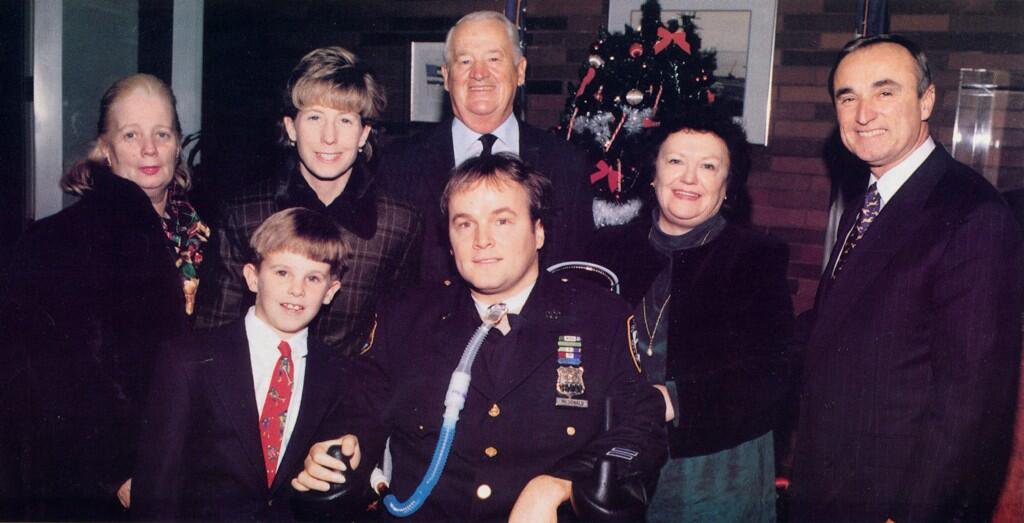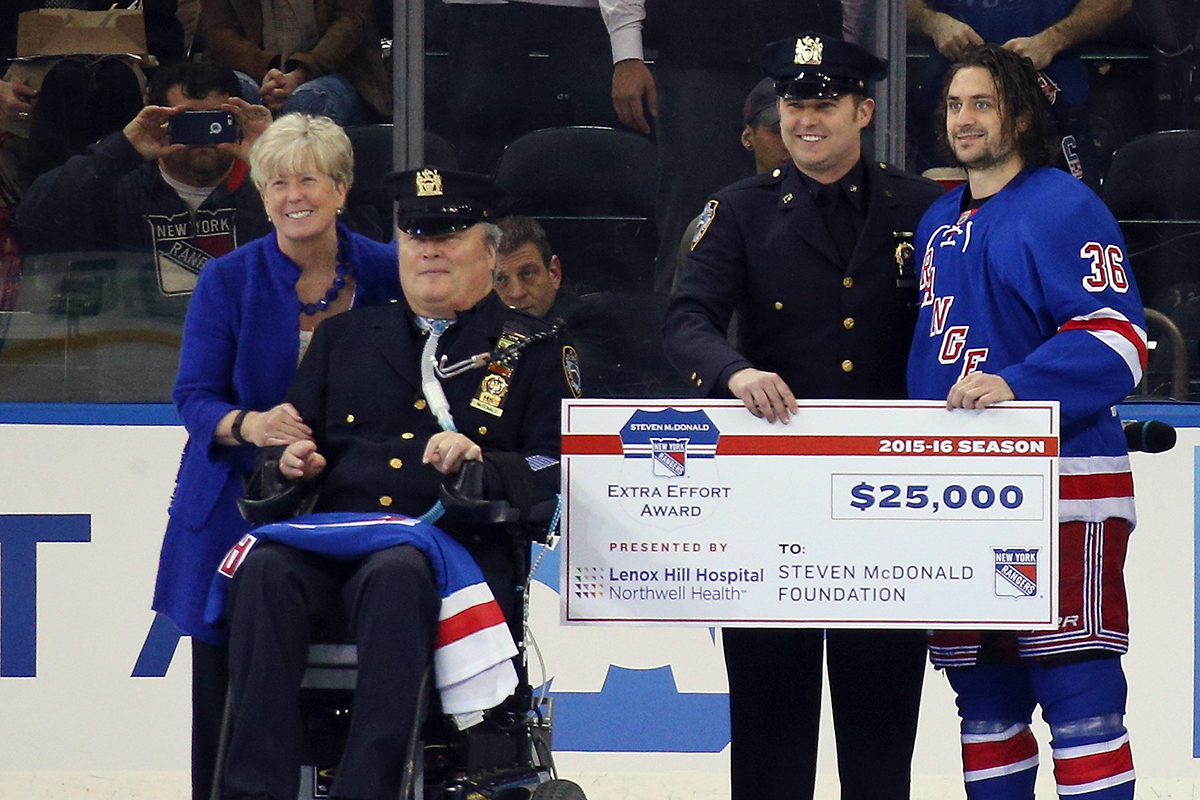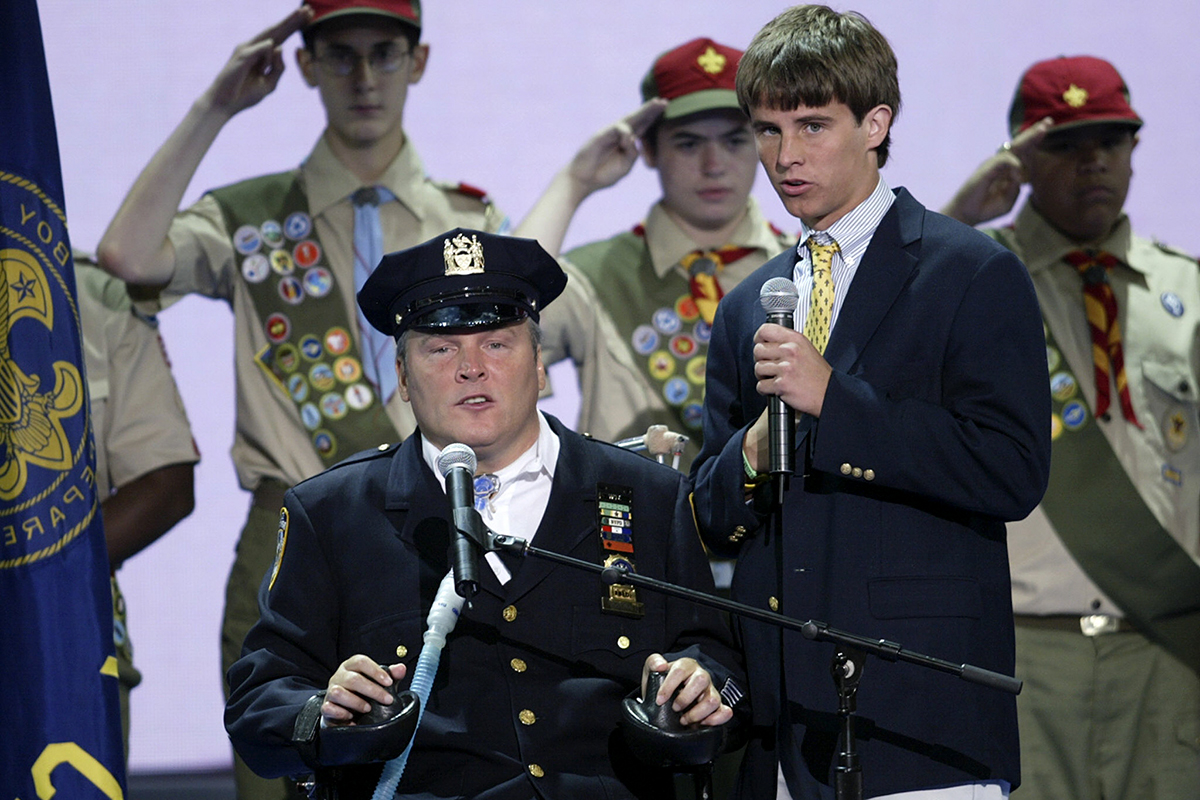Policeman shot and paralyzed in 1986 forgave his assailantNew York City Police Detective Steven McDonald, who forgave the young man who shot him, leaving him paralyzed for life, has died at the age of 59. In the almost 31 years since the 1986 Central Park shooting, McDonald became a frequent speaker on the power of forgiveness,
McDonald suffered a massive heart attack on January 6 and died January 10 at North Shore University Hospital on Long Island. He leaves behind his wife, Patricia Ann McDonald, the mayor of Malverne, Long Island, where the couple lived, and a son, Conor, who is also a New York City detective.
“Steven traveled across oceans, to communities far and wide, to spread his message of hope, courage, forgiveness, and redemption,” James P. O’Neill, New York’s Police Commissioner, said in a statement to the department. “Steven got the most pleasure from speaking with you, his fellow cops. He would visit your commands, and your roll calls, on any tour. And he would talk about using tactics and watching out for one another. He wanted every police officer to lead a life of significance, to feel safe, and to be safe.”
McDonald was 29 and a police officer for just under two years when he was on a routine patrol of Central Park on the night of July 12, 1986. He stopped to question three youths about some bicycle robberies, and one of them, 15-year-old Shavod Jones, pulled out a gun and shot him. Three bullets pierced his head and neck, and one shattered his spine between the second and third vertebrae.
Doctors at first told his wife, who was expecting their first child, that he wouldn’t live through the afternoon.

In a 2014 interview with Irish America, McDonald recalled the day the neurosurgeon at Bellevue told his wife, “Mrs. McDonald, the way you see Steven is the way he’s always going to be.”
“And he walked out of the room,” McDonald recalled. “Patti Ann collapsed on the floor crying and I couldn’t move to comfort her or call for help. It was just awful.”
McDonald would spend the rest of his days in a wheelchair and dependent on a ventilator.
In his convalescence, he sometimes thought about taking his own life, but his wife helped him get through his depression. “She got on the phone and called Cardinal [John] O’Connor [then archbishop of New York] and he came right over with [his secretary] Monsignor [James] McCarthy. They spent the whole day into the night with me. They comforted me in my depression and talked me out of it.”
It’s a subject he sometimes discussed in talks with fellow police officers.
The cardinal told Patti Ann that he would ensure that Mass would be offered daily at McDonald’s bedside.
He also offered to baptize the couple’s son, and it was during the ritual that McDonald reached out to his assailant. The New York Times recounts:
At his son’s baptism in a chapel at Bellevue in early 1987, Officer McDonald wrote of [Shavod] Jones in a statement that was read by his wife. “I forgive him,” he said, “and hope that he can find peace and purpose in his life.”
Mr. Jones was convicted of attempted murder. In the summer of 1988, Officer McDonald sent stamps and a box of stationery to Mr. Jones along with a note saying, “Let’s carry on a dialogue.” He later met with Mr. Jones’s mother and attended services at a Baptist church in Harlem with his grandmother.
The correspondence continued for a while but ended after Officer McDonald turned down a request from Mr. Jones’s family to seek parole. The officer said he was not knowledgeable or capable enough to intervene.
Mr. Jones was paroled in 1995 after eight and half years in prison, having faced up to 10 years under guidelines for sentencing juvenile offenders.
Four days after coming home, Mr. Jones died of head injuries he sustained the previous day when a speeding motorcycle on which he was a passenger crashed into parked cars while performing wheelies in East Harlem, his old neighborhood, the police said at the time.
NBC New York said that in the years after the shooting, McDonald became “one of the world’s foremost pilgrims for peace. He took his message of forgiveness to Israel, Northern Ireland and Bosnia.”
One person who accompanied him on those trips, particularly to Northern Ireland, was Franciscan Father Mychal Judge, a Fire Department chaplain who was killed at the World Trade Center on Sept. 11, 2001. Father Judge had been one of the priests on rotation to say Mass in McDonald’s hospital room.
“John Cardinal O’Connor and Father Mike were the two that helped me most understand the message of forgiveness,” McDonald said in an interview three days after the terrorist attacks. “When I was called to forgive, it was their message and homilies that helped me understand, to love my fellow human being. [Father Judge] would pray with me. He spent many hours next to my bed.”
McDonald’s son, Conor, followed in his father’s footsteps, joining the NYPD in 2010.
“The city of New York did a lot of great things for my family in 1986 when my father was shot,” he said at a press conference following his swearing in ceremony. “I want to do my best to protect and serve the people that helped give my family a second life.”
Conor told Irish America in 2014 that he decided to join the force after serving for a year with AmeriCorps in Denver, working with runaways and at-risk youth. “When you think of Denver, you think of the mountains, how beautiful it is, but I met kids there who had crazy lives,” he said. “Kids from Maryland who were scammed and got stuck out there, and kids who had escaped out of gangs in California.”
In September, Steven McDonald witnessed his son receive a promotion to detective. Conor McDonald’s gold shield number is the same as that of a friend of his father’s who was instrumental in his recovery.
Queens District Attorney Richard Brown called McDonald’s death an “insurmountable loss for the children of New York City.”

“He so generously lent his time to youth anti-violence initiatives like my office’s STAR Track (Straight Talk About Risks) program, which helps children in Far Rockaway ‘say no to violence’ by avoiding gangs, drugs and guns,” Brown said in a statement. “Steven’s example has had an immeasurable impact on the path that these children will take in life.”
New York Cardinal Timothy Dolan said McDonald had become a “living, breathing prophet of reconciliation and charity.”
“He publicly forgave the young boy” who shot him, Dolan said on SiriusXM’s Catholic Channel Tuesday. “He went to bat for him asking for mercy, he visited him in prison.”
“A gunshot changed Steven McDonald’s life forever but it never changed his soul and his belief in God and mankind,” wrote Niall O’Dowd at Irish Central.
Though he got to be a familiar face on the Catholic speaking circuit, McDonald was the first to admit that he was no holier-than-thou.

“Have I always been close to God or led the perfect life?” McDonald said in the 2014 interview with Irish America. “I don’t pretend to be that kind of person. But in this journey I’ve been on with Patti Ann and Conor we found out that the only way forward was Christlike love. This way of loving has made so much good possible in our lives and our world. Once you let go of the wrongs that have been done to you it changes everything. I could have gone the other way. I could have been overcome with emotion, bitterness and anger. Patti called them wasted emotions. I could have killed myself. I tried to. God always found me, and with the help of others I got through it all.”
Irish America asked McDonald what inspires him.
“Patti Ann,” he answered simply. “I’m sure that there have been times where she has said, ‘I can’t deal with this.’ She would only be human if she felt that way. But as a young bride she gave up a lot of dreams to keep me alive, and keep us together as a family.”
Cardinal Dolan will offer a Mass of Christian Burial for Steven McDonald at Saint Patrick’s Cathedral on Friday.








